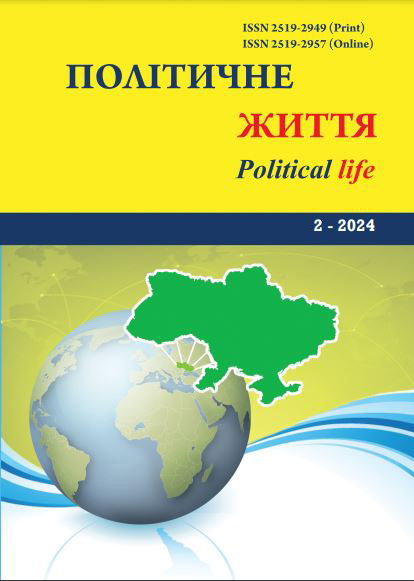The political regime of Hungary: from partyocracy to electoral autocracy and organised kleptocracy
DOI:
https://doi.org/10.31558/2519-2949.2024.2.15Keywords:
Hungary, Viktor Orbán, electoral autocracy, Fidesz party, Fidesz partyAbstract
The article focuses on the transformation of Hungary’s political regime since 2010, when the Fidesz party led by Viktor Orbán has won every parliamentary election in the country. The main text consists of four parts. The first part defines the relevance of article and describes the theoretical and methodological tools for studying political regimes. The second part analyses the political regime of Hungary until 2010. It is found that the most appropriate term for it is “partyocracy” – that is, democracy, which is reduced to the activities of political parties with little participation of civil society. In addition, the author notes the prevalence of informal ties over formal rules, which is a sign of the regime’s high hybridity. These features, together with Hungarian disillusionment with politics, contributed to the concentration of power in the Fidesz party. The third part is devoted to the methods of consolidation of power around the ‘political family’ of Viktor Orbán. It is proved that consolidation takes place in two ways. Firstly, through gradual changes in formal rules and institutions in favour of the ruling party (which culminated in the adoption of the new Constitution without public discussion and opposition consent). Secondly, by building a pyramidal network of informal mafia-like connections. Thus, there was a ‘party colonisation’ of various spheres of society, within which big business and the media were co-opted into the system of power. The three most promising conceptual models describing the current regime in Hungary were also analysed: A. Agh’s “zombie democracy”, S. Guriev and D. Treisman’s “spin-dictatorship”, and B. Magyar’s “post-communist mafia state”. Finally, the fourth part of the article offers the author’s own conceptual model of the Hungarian political regime as an electoral autocracy in the form of an organised kleptocracy. This model covers the issue of authoritarian control in Hungary and the issue of authoritarian distribution of power within the political elite of the regime, and can serve as a basis for further research in this area.
References
Fishman, R. Rethinking State and Regime: Southern Europe’s Transition to Democracy. World Politics 42 (April), 1990. P. 422–440.
Higley J., Burton M. G. The Elite Variable in Democratic Transitions and Breakdowns. American Sociological Review, vol. 54, no. 1, 1989. P. 17–32.
Мацієвський Ю. В. У пастці гібридності: зиґзаґи трансформацій політичного режиму в Україні (1991-2014) : монографія. Чернівці : Книги – XXI, 2016. 552 c.
Linz J. J. Totalitarian and Authoritarian Regimes. Lynne Rienner Publishers, 2000. 351 p.
Linz J. J., Stepan A. Problems of Democratic Transition and Consolidation: Southern Europe, South America, and Post-Communist Europe. Johns Hopkins University Press, 1996. 502 p.
Bozóki A., Simon E. Hungary since 1989/Central and Southeast European Politics since 1989. S. P. Ramet (ed). Cambridge University Press, 2010. P. 204–233.
Bajomi-Lázár P. (2013). The Party Colonisation of the Media: The Case of Hungary. East European Politics and Societies, 27(1), 2013. P. 69-89.
Lengyel G., Ilonszki G. Hungary: Between Consolidated and Simulated Democracy/ Democratic Elitism: New Theoretical and Comparative Perspectives. Best H., Higley J. (Editors). BRILL, 2010. P. 153–172.
Kornai J. (2015). Hungary’s U-Turn: Retreating from Democracy. Journal of Democracy, 26(3), 2015. P. 34–48.
Pap, A. L. Democratic decline in Hungary: law and society in an illiberal democracy. Routledge, 2018. 180 p.
Magyar B. Post-Communist Mafia State: The Case of Hungary. Central European University Press, 2016. 336 p.
Ágh A. The Orbán regime as the ‘perfect autocracy’: The emergence of the ‘zombie democracy’ in Hungary. Politics in Central Europe, 18, 2022. P.1–25.
Scheppele Kim Lane. Legal but not Fair: Viktor Orbán’s New Supermajority. New York Times, 2014. URL: https://archive.nytimes.com/krugman.blogs.nytimes.com/2014/04/13/legal-but-not-fair-hungary/?_php=true&_ type=blogs&_r=0.
Viktor Orbán’s Speech at Băile Tuşnad (Tusnádfürdő) of 26 July 2014. The Budapest Beacon. URL: https://budapestbeacon.com/full-text-of-viktor-orbans-speech-at-baile-tusnad-tusnadfurdo-of-26-july-2014/
Haraszti M. Viktor Orbán’s Propaganda State/ Brave New Hungary. Mapping the System of National Cooperation. J. M. Kovács, T. Balazs (eds). Lexington Books, 2020. P. 211–225.
Гурієв С., Трейсман Д. Спін-диктатори. Як змінюються обличчя тиранії в ХХІ столітті / Пер. з англ. О. Бершадська. Book Chef, 2023. 432 с.
Zombie democracy. The Economist, 2013. URL: https://www.economist.com/leaders/2013/06/22/zombie-democracy
Svolik M. The Politics of Authoritarian Rule. Cambridge University Press, 2012. 254 p.
Schedler A. The Logic of Electoral Authoritarianism/ Electoral Authoritarianism. The Dynamics of Unfree Competition. A. Schedler (ed). Lynne Rienner Publishers, 2006. P. 1–27.

